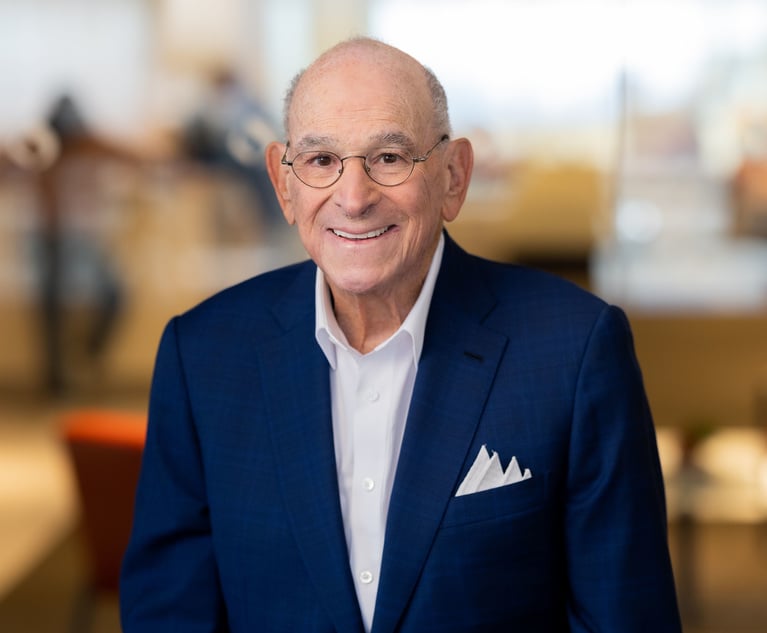 Image: Shutterstock
Image: ShutterstockWill 2019 Be the Year Outsiders Invest in US Law Firms?
The barriers to outside investment are still significant, but change is in the air.
December 21, 2018 at 03:00 PM
4 minute read
The original version of this story was published on The American Lawyer
Nonlawyer ownership of U.S. law firms has been a stale conversation for quite some time. That is slowly changing, as a number of developments in 2018 have, at the very least, teed up the possibility that outsiders may soon have a chance to invest in the business of Big Law.
ALM and The American Lawyer tracked those developments throughout the year, uncovering signs that the long-held regulatory barriers to outside investment in U.S. law firms may be becoming more porous. Here is some of what we reported:
Is Outside Ownership of Law Firms Picking Up Steam? Perhaps the most promising present-day solution to law firms' underinvestment problems comes from litigation funders. While those businesses have traditionally been thought of as financing lawsuits, Burford Capital LLC in 2018 said it was exploring avenues to serve as an investment bank for law firms. Burford's plan would involve spinning off the back end of a law firm. Set up as a more traditional corporation, it would have long-term equity that would be open to investment from non-JDs.
The Law Firm Disrupted: A Present-Tense Solution to Law Firms' Short-Term Thinking That kind of structure is already in place at Atrium, a Silicon Valley-backed startup that has paired a LLP law firm with a corporation that employs software engineers. Atrium Legal Technology Services Inc., “a non-law corporation incorporated under the laws of the State of Delaware,” this year received $65 million in financing, led by prominent venture capital firm Andreessen Horowitz. Many Big Law firms are watching to see if the pairing of lawyers with engineers will provide breakthroughs for how the law is practiced.
The Law Firm Disrupted: Outside Ownership of a Law Firm Alert Further down the line, California's state bar is studying the question of whether liberalizing the ownership rules for law firms would be beneficial to clients. A committee, which includes both lawyers and clients, has been formed to prepare a report on the topic. Its work is due by the end of 2019. The proposal was spurred by a report prepared for The State Bar of California by William Henderson, an Indiana University Maurer School of Law professor, who said that the current rules have limited access to lawyers to about 10 percent of the population.
California Bar to Consider Changes to Nonlawyer Ownership Rules Why is all this of interest? Because restrictions on law firm ownership have made it difficult for firms to invest in long-term projects that could improve the efficiency of the services they deliver. As law firms increasingly look to “innovate” by investing in technology and experts in the areas of pricing, tech and consulting practices, they would be bolstered by the ability to pay them from a pool of capital outside of the traditional partner draws. Yale Law School professor John Morley says their capital structure creates problems of “generational transfer” that are akin to governments that have difficulty convincing present-day citizens to pay for policies that would benefit tomorrow's citizens.
“It's no coincidence that law firms and other professional services firms are the only large businesses still existing in America that have unfunded pension plans,” Morley said. “And they have them for the same reason as towns and cities, which is they have a problem with generational transfer.”
The Law Firm Disrupted: 'Pathologically Present-Focused' Law Firms and Chipotle It's unlikely that 2019 will see a revolution in how U.S. law firms are financed. The U.K. since 2011 has allowed outside investment in law firms, and it has not yet made a dramatic impact on Big Law. Nevertheless, the conversation is growing louder in the U.S.
This content has been archived. It is available through our partners, LexisNexis® and Bloomberg Law.
To view this content, please continue to their sites.
Not a Lexis Subscriber?
Subscribe Now
Not a Bloomberg Law Subscriber?
Subscribe Now
NOT FOR REPRINT
© 2024 ALM Global, LLC, All Rights Reserved. Request academic re-use from www.copyright.com. All other uses, submit a request to [email protected]. For more information visit Asset & Logo Licensing.
You Might Like
View All
These Law Firm Leaders Are Optimistic About 2025, Citing Deal Pipeline, International Business
6 minute read
‘A Force of Nature’: Littler Mendelson Shareholder Michael Lotito Dies At 76
3 minute read
Remembering Am Law 100 Firm Founder and 'Force of Nature' Stephen Cozen
5 minute read
Legal Departments Gripe About Outside Counsel but Rarely Talk to Them
4 minute readTrending Stories
- 1Call for Nominations: Elite Trial Lawyers 2025
- 2Senate Judiciary Dems Release Report on Supreme Court Ethics
- 3Senate Confirms Last 2 of Biden's California Judicial Nominees
- 4Morrison & Foerster Doles Out Year-End and Special Bonuses, Raises Base Compensation for Associates
- 5Tom Girardi to Surrender to Federal Authorities on Jan. 7
Who Got The Work
Michael G. Bongiorno, Andrew Scott Dulberg and Elizabeth E. Driscoll from Wilmer Cutler Pickering Hale and Dorr have stepped in to represent Symbotic Inc., an A.I.-enabled technology platform that focuses on increasing supply chain efficiency, and other defendants in a pending shareholder derivative lawsuit. The case, filed Oct. 2 in Massachusetts District Court by the Brown Law Firm on behalf of Stephen Austen, accuses certain officers and directors of misleading investors in regard to Symbotic's potential for margin growth by failing to disclose that the company was not equipped to timely deploy its systems or manage expenses through project delays. The case, assigned to U.S. District Judge Nathaniel M. Gorton, is 1:24-cv-12522, Austen v. Cohen et al.
Who Got The Work
Edmund Polubinski and Marie Killmond of Davis Polk & Wardwell have entered appearances for data platform software development company MongoDB and other defendants in a pending shareholder derivative lawsuit. The action, filed Oct. 7 in New York Southern District Court by the Brown Law Firm, accuses the company's directors and/or officers of falsely expressing confidence in the company’s restructuring of its sales incentive plan and downplaying the severity of decreases in its upfront commitments. The case is 1:24-cv-07594, Roy v. Ittycheria et al.
Who Got The Work
Amy O. Bruchs and Kurt F. Ellison of Michael Best & Friedrich have entered appearances for Epic Systems Corp. in a pending employment discrimination lawsuit. The suit was filed Sept. 7 in Wisconsin Western District Court by Levine Eisberner LLC and Siri & Glimstad on behalf of a project manager who claims that he was wrongfully terminated after applying for a religious exemption to the defendant's COVID-19 vaccine mandate. The case, assigned to U.S. Magistrate Judge Anita Marie Boor, is 3:24-cv-00630, Secker, Nathan v. Epic Systems Corporation.
Who Got The Work
David X. Sullivan, Thomas J. Finn and Gregory A. Hall from McCarter & English have entered appearances for Sunrun Installation Services in a pending civil rights lawsuit. The complaint was filed Sept. 4 in Connecticut District Court by attorney Robert M. Berke on behalf of former employee George Edward Steins, who was arrested and charged with employing an unregistered home improvement salesperson. The complaint alleges that had Sunrun informed the Connecticut Department of Consumer Protection that the plaintiff's employment had ended in 2017 and that he no longer held Sunrun's home improvement contractor license, he would not have been hit with charges, which were dismissed in May 2024. The case, assigned to U.S. District Judge Jeffrey A. Meyer, is 3:24-cv-01423, Steins v. Sunrun, Inc. et al.
Who Got The Work
Greenberg Traurig shareholder Joshua L. Raskin has entered an appearance for boohoo.com UK Ltd. in a pending patent infringement lawsuit. The suit, filed Sept. 3 in Texas Eastern District Court by Rozier Hardt McDonough on behalf of Alto Dynamics, asserts five patents related to an online shopping platform. The case, assigned to U.S. District Judge Rodney Gilstrap, is 2:24-cv-00719, Alto Dynamics, LLC v. boohoo.com UK Limited.
Featured Firms
Law Offices of Gary Martin Hays & Associates, P.C.
(470) 294-1674
Law Offices of Mark E. Salomone
(857) 444-6468
Smith & Hassler
(713) 739-1250








